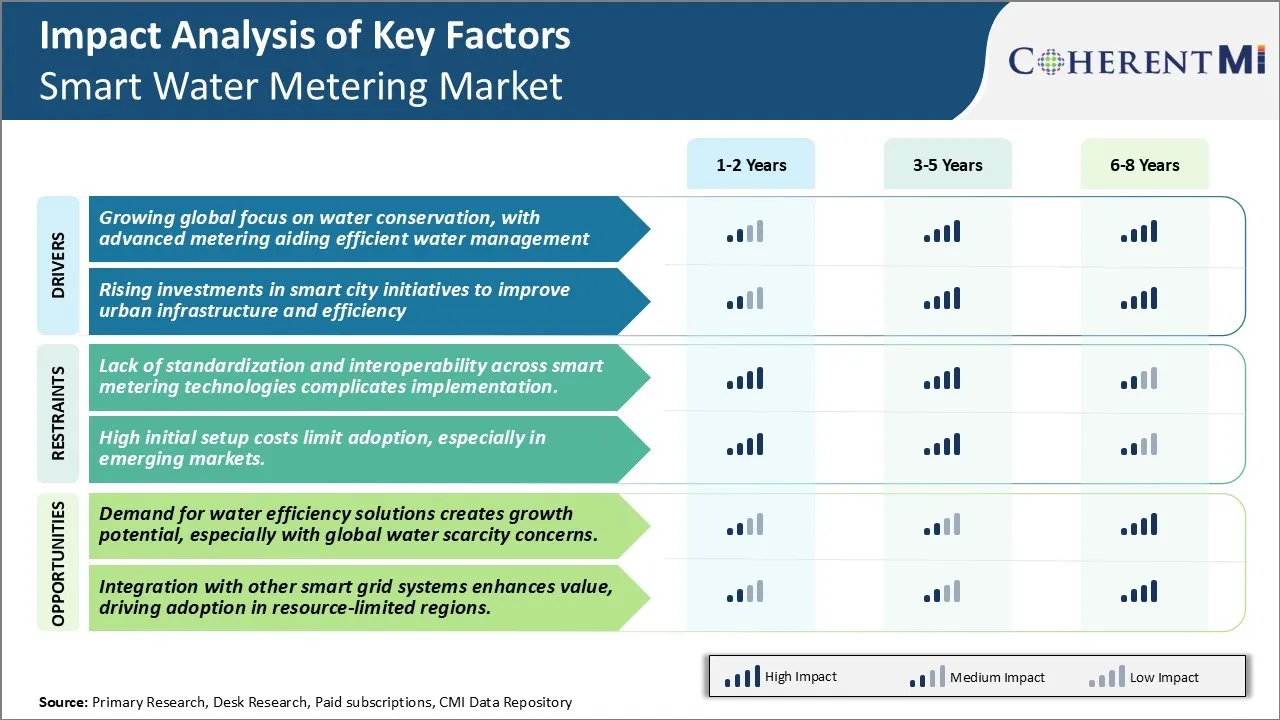Smart Water Metering Market Trends
Market Driver - Growing Global Focus on Water Conservation
Many regions around the world are facing water scarcity issues, with some predicting potential water crises if consumption and loss is not curtailed. As a result, there is a growing impetus on implementing strategies and technologies that promote the efficient and sustainable use of this precious resource. Advanced, smart water metering infrastructure has been identified as a valuable tool in aiding conservation efforts and reducing non-revenue water losses.
Smart water metering allows for automated and remote meter reading, eliminating the need for manual readings and tackling the inaccuracies this can sometimes introduce. Utilities have real-time visibility to detect leaks or unusual usage that may indicate wastage. They can better target initiatives to encourage behavioral changes in high usage areas or during peak times.
Residential customers also benefit from smart metering by having access to their own water use details. Seeing the quantifiable impact of habits helps raise awareness of unnecessary consumption. It can also drive growth of the smart water metering market over the long-run.
Market Driver - Rising Investments in Smart City Initiatives
City administrators worldwide today, are seeking innovative ways to modernize aging infrastructure and cope with increasing pressures on resources and liveability. Smart city initiatives aim to leverage emerging technologies across sectors like transportation, energy management, and urban planning in creating more efficient, sustainable, and inclusive urban environments.
Investments are pouring into upgrading ageing water networks with IoT-enabled solutions. Smart metering finds itself at the core of these digitization drives. Automating meter reading and introducing analytics enables proactive leak detection and demand management. This results in significant savings through reduced non-revenue water and optimized resource utilization.
Utilities tapping into global expertise and financing for smart transformation have been able to strengthen resilience, enhance service quality and gain operational efficiencies through digital intervention in water management. As more cities worldwide invest billions into smart infrastructure developments, the opportunities for players in the smart water metering market.

Market Challenge - Lack of Standardization and Interoperability
The lack of standardization and interoperability across different smart water metering technologies presents a major challenge for wider implementation. Currently, there are a variety of proprietary hardware and software solutions available in the market.
However, these solutions often do not follow common standards and protocols, making them incompatible with one another. This severely limits utility companies and municipalities' ability to integrate different technologies into a single coordinated system. Incompatible systems also increase costs associated with upgrading existing infrastructure. Interfacing disparate systems requires additional software, hardware modifications, and custom integration work.
The heterogeneous landscape of technologies further complicates data aggregation and analysis at a network level. If smart water metering is to achieve large scale adoption, developing globally recognized standards for device communication, data formats, and cybersecurity will be essential.
Market Opportunity - Demand for Water Efficiency Solutions Creates Growth Potential
Growing concerns around global water scarcity are creating significant market potential for water efficiency solutions like smart water metering. Population growth, rising incomes, and urbanization are straining water resources in many parts of the world.
At the same time, aging water infrastructure is contributing to high non-revenue water losses through leaks and breaks. Advanced metering infrastructure offers utilities the ability to more accurately monitor real-time water usage, detect leaks and reduce non-revenue water. They also empower customers to better manage their water consumption through mobile apps and data access.
As water scarcity risks intensify with climate change, demand is increasing for smart water metering solutions that maximize efficiencies. This macro trend will continue driving the adoption of smart water metering globally as countries aim to sustainably manage this critical resource through demand reductions, efficiencies, and increased conservation.